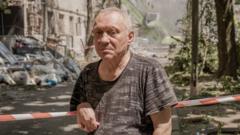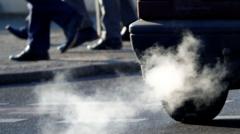Is Kyiv's Night of Terror Hiding Tragic Secrets?

The Human Cost of War: A Glimpse into the Lives Shattered by the Kyiv Missile Attack
In the early hours of a seemingly ordinary day in Kyiv, an unimaginable tragedy unfolded. A cruise missile struck a residential block, leaving behind death, destruction, and despair. This incident, part of a larger wave of attacks across Ukraine, serves as a stark reminder of the ongoing conflict and its profound impact on ordinary lives. This article delves into the harrowing experiences of those affected, the broader implications of the attack, and the urgent need for international support in the face of such adversity.
A Day Like No Other: The Attack on Solomianskyi Neighborhood
Evhen Povarenkov, a warehouse worker, found himself standing amidst the chaos that ensued after the missile strike on his apartment building in the Solomianskyi neighborhood of Kyiv. The blast, which occurred at approximately midnight, obliterated 35 apartments and left a gaping hole in the building where once there was a home. The sound of the explosion was deafening, and the aftermath was nothing short of catastrophic.
Witnesses described the scene as one of total chaos. Personal belongings littered the ground, and the air was thick with smoke and debris. For Povarenkov, the nightmare began while he was in bed, unaware of the danger looming just outside his walls. “There was heat, fire, and smoke,” he recounted, his voice shaking as he recalled the moment the missile struck. “I lost consciousness. When I came to, I heard my mother screaming.”
The Immediate Response and Rescue Efforts
As the dust settled, a frantic rescue operation commenced. Neighbors joined forces to help one another escape from the wreckage. Povarenkov’s elderly mother, who was asleep in the next room, suffered severe injuries—two broken collarbones, cuts to her eyes, and internal organ damage that necessitated urgent surgery.
- **23 confirmed dead** in the immediate aftermath.
- Over **100 wounded** individuals were reported, with injuries ranging from soft tissue damage to severe traumatic brain injuries.
- Emergency personnel worked tirelessly, with reports indicating that **27 patients** were treated at a single local hospital.
The Broader Implications: A Message from the East
This missile strike was not an isolated incident but part of a larger wave of aggression directed at Ukraine. In total, more than 440 drones and 32 missiles were launched during a nine-hour barrage, making it one of the most intense attacks on Kyiv since the onset of the full-scale invasion. Analysts speculate that the timing of the strike was intentional—a brutal message from Russia as Ukrainian President Volodymyr Zelensky was attending the G7 conference in Canada.
The attack underscored Ukraine's urgent need for international support, particularly in terms of enhancing air defense systems. The absence of a substantial response from Western allies during this critical time raised questions about the effectiveness of current support mechanisms. Zelensky’s anticipated meetings with world leaders did not yield the hoped-for outcomes. Instead, the crisis in the Middle East overshadowed Ukraine's plight, leading to missed opportunities for diplomatic support.
The Aftermath: Lives Forever Changed
The immediate aftermath of the attack left many residents of the Solomianskyi neighborhood grappling with the reality of their new existence. The destruction went beyond physical buildings; it extended deeply into the fabric of community life. For many, the prospect of returning to normalcy felt like a distant dream.
Residents such as Oleksandr Bondarchuk, a 64-year-old disabled man, found themselves without shelter. Unable to reach safety during the attack, he remembered lying in bed, paralyzed by fear. “It was terrible,” he said, reflecting on the devastation. “Everything was destroyed.”
Others fared slightly better, finding temporary refuge with friends or family. However, the overarching sentiment was one of profound loss. The community that once thrived within the walls of the apartment building was now fragmented, with many residents uncertain about their future.
The Role of Healthcare Workers in Crisis
Dr. Serhii Dubrov, an anesthesiologist and director of a local hospital, witnessed firsthand the devastating impact of the missile strike on the healthcare system. His facility received a surge of patients within hours of the attack, each presenting with critical injuries that required immediate attention. The nature of the injuries was a grim reflection of the violence that had erupted in their lives.
Dr. Dubrov described a range of injuries, from lacerations caused by shattered glass to severe internal trauma. “The worst was a woman with an open head injury,” he recalled. Such injuries are not only physically devastating but also contribute to the psychological scars borne by survivors.
The Psychological Impact of War
The psychological toll of such attacks cannot be understated. Survivors often face long-term mental health challenges, including PTSD, anxiety, and depression. The chaos of the night, combined with the trauma of loss, leaves deep-seated emotional wounds that require ongoing support and care.
For many, the question is not just about physical recovery but also about how to rebuild their lives in the wake of such trauma. Community support, mental health resources, and robust healthcare systems are essential to helping individuals navigate the aftermath of such catastrophic events.
The Global Responsibility: The Need for International Support
The missile strike on the Solomianskyi neighborhood serves as a stark reminder of the ongoing humanitarian crisis in Ukraine. As the conflict continues, the need for international support becomes ever more pressing. Enhanced air defense systems, financial aid, and humanitarian assistance are critical components of any meaningful response to the crisis.
Moreover, the international community must recognize the importance of standing in solidarity with those affected by the conflict. Diplomatic efforts must be intensified to seek a resolution that prioritizes peace and the welfare of civilians caught in the crossfire.
A Call to Action: What Can Be Done?
- **Advocating for increased humanitarian aid** to support those displaced by the conflict.
- **Promoting awareness** of the psychological impact of war, ensuring that mental health resources are available to survivors.
- **Encouraging international dialogue** aimed at finding a peaceful resolution to the conflict.
Conclusion: The Resilience of the Human Spirit
As Evhen Povarenkov stood amidst the ruins of his home, he was not just a witness to destruction but a testament to the resilience of the human spirit. Despite the pain and loss, there is a glimmer of hope in the determination of individuals to rebuild their lives and support one another in the face of adversity. The stories of those affected by the missile strike in Kyiv highlight the urgent need for compassion and action from the global community.
The road ahead will be fraught with challenges, but with collective effort, it is possible to foster hope and healing in a region so deeply scarred by conflict. How can we, as a global community, ensure that the voices of the affected are heard and that their needs are met? The power of unity and support can help pave the way for a brighter future.
FAQs
What happened during the missile attack in Kyiv?
The missile attack struck a residential block in the Solomianskyi neighborhood, destroying 35 apartments and resulting in numerous casualties, including 23 confirmed deaths.
How did the local healthcare system respond to the attack?
Local hospitals received a surge of injured individuals, with reports indicating significant trauma, including soft tissue injuries, lacerations, and severe internal injuries.
What is the psychological impact of such attacks on survivors?
Survivors often experience long-term mental health challenges, including PTSD, anxiety, and depression, necessitating ongoing support and care.
The stories from Kyiv serve as harrowing reminders of the human cost of conflict. As the world watches, it is crucial to reflect on how we can contribute to peace and healing. Can we do enough to support those affected and foster an environment of hope for the future? #KyivStrong #HumanRights #SupportUkraine
Published: 2025-06-18 18:04:14 | Category: world



